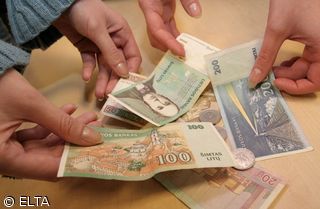VAT rules to change May 1
Published:
17 March 2004 y., Wednesday
An easing of the cash flow burden posed by VAT on intra-community trade and imports from outside the EU; a hike in administrative tasks for local companies; the introduction of a new VAT grouping scheme; positive changes in VAT regulations concerning call-off stock; these are among a slew of changes to the law on value-added tax passed by Parliament last Monday.
Lawmakers also reversed a regulation obliging foreign consignment stock companies to establish branch offices or subsidiaries when serving clients from Hungary.
The amendments will mostly take effect upon EU accession on May 1.
“The new VAT law brought in several unexpected positive changes,” Rуbert Heinczinger, tax partner at Ernst & Young Advisory Kft, said last week.
“Despite its shortcomings, the new law reflects the lawmakers’ efforts to improve Hungary’s competitiveness in the EU,” commented Regina Simon, tax manager at rival KPMG, speaking at the company’s press briefing last Friday.
Amongst the positive changes, Simon noted that importers no longer have to finance the VAT on all imports from their cash flow. From May 1, local companies involved in intra-community trading – trading within the EU – do not have to pay VAT in advance on products brought in from within the community.
The VAT content of such transactions will have to be declared at the end of the regular VAT declaration period, and VAT paid in that period can be deducted from VAT gains.
“This is good news for local companies,” Simon said.
According to Simon, however, companies trading in the EU will have to pay attention to administrative tasks like obtaining and regularly updating the EU tax registry number of all their trading partners.
This is because the EU’s VAT directive essentially states that companies sell their goods to buyers from another EU country without charging sales tax, and the foreign entity declares and pays the sales tax in its own country.
“If the tax number is missing or wrong, it will be impossible to track whether the due VAT was footed by the foreign partner. In such cases, the local tax office will make the local company pay the missing VAT amount,” she explained.
Šaltinis:
bbj.hu
Copying, publishing, announcing any information from the News.lt portal without written permission of News.lt editorial office is prohibited.
The most popular articles
 According to the data presented by the Ministry of Finance, in end-January central government debt made up LTL26, 310.8 million or 28% of projected GDP for 2010 (LTL 93, 819 million).
more »
According to the data presented by the Ministry of Finance, in end-January central government debt made up LTL26, 310.8 million or 28% of projected GDP for 2010 (LTL 93, 819 million).
more »
 As far as countries affected by the economic crisis, China fared extremely well.
more »
As far as countries affected by the economic crisis, China fared extremely well.
more »
 The European Commission has authorised today a Slovak scheme with a budget of approximately €3.32 million which aims at supporting farmers in Slovakia who encounter difficulties as a result of the current economic crisis.
more »
The European Commission has authorised today a Slovak scheme with a budget of approximately €3.32 million which aims at supporting farmers in Slovakia who encounter difficulties as a result of the current economic crisis.
more »
 Commission sets out a 10-year strategy for reviving the European economy, casting a vision of ‘smart, sustainable, inclusive' growth rooted in greater coordination of national and European policy.
more »
Commission sets out a 10-year strategy for reviving the European economy, casting a vision of ‘smart, sustainable, inclusive' growth rooted in greater coordination of national and European policy.
more »
 The European Commission has launched today the Europe 2020 Strategy to go out of the crisis and prepare EU economy for the next decade. The Commission identifies three key drivers for growth, to be implemented through concrete actions at EU and national levels.
more »
The European Commission has launched today the Europe 2020 Strategy to go out of the crisis and prepare EU economy for the next decade. The Commission identifies three key drivers for growth, to be implemented through concrete actions at EU and national levels.
more »
 Launching of the “SCHOOLS’ initiative for innovation and changes” Grant scheme.
more »
Launching of the “SCHOOLS’ initiative for innovation and changes” Grant scheme.
more »
 EU Member States must not only deliver on their international aid pledges, but also bring in a financial transactions tax and a temporary debt moratorium, to help developing countries to cope with the effects of the global financial and economic crisis, said the Development Committee on Monday.
more »
EU Member States must not only deliver on their international aid pledges, but also bring in a financial transactions tax and a temporary debt moratorium, to help developing countries to cope with the effects of the global financial and economic crisis, said the Development Committee on Monday.
more »
 The EBRD is increasing its commitments to promote sustainable energy projects in Slovakia with a new €90 million funding under the existing Slovakia Sustainable Energy Finance Facility (SLOVSEFF) to ensure continuous implementation of energy efficiency and small renewable energy projects.
more »
The EBRD is increasing its commitments to promote sustainable energy projects in Slovakia with a new €90 million funding under the existing Slovakia Sustainable Energy Finance Facility (SLOVSEFF) to ensure continuous implementation of energy efficiency and small renewable energy projects.
more »
 According to the unaudited data, in 2009 AB Bank SNORAS earned LTL 8.7 million profit. The bank’s assets grew by 11 per cent up to LTL 6.342 billion during 2009 and were by LTL 647.8 million larger than at the beginning of 2009.
more »
According to the unaudited data, in 2009 AB Bank SNORAS earned LTL 8.7 million profit. The bank’s assets grew by 11 per cent up to LTL 6.342 billion during 2009 and were by LTL 647.8 million larger than at the beginning of 2009.
more »
 Aviation security measures that go beyond common EU requirements should be paid for by Member States, not by passengers, said Transport Committee MEPs in a vote on Monday that could put Parliament on a collision course with the Council of Ministers.
more »
Aviation security measures that go beyond common EU requirements should be paid for by Member States, not by passengers, said Transport Committee MEPs in a vote on Monday that could put Parliament on a collision course with the Council of Ministers.
more »